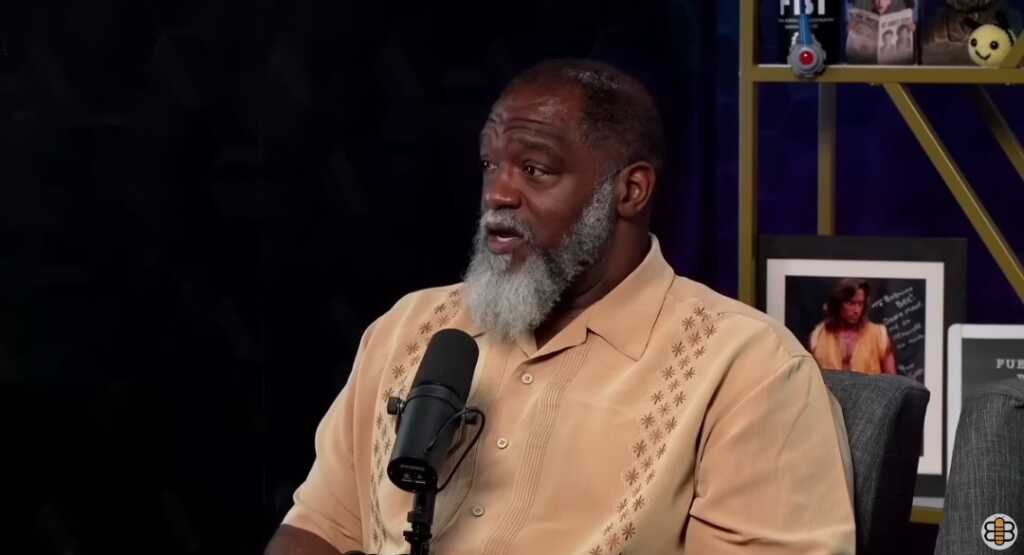Pastor and author Voddie Baucham isn’t among those watching the hit TV series “The Chosen,” with the renowned Christian thinker revealing his reasons are rooted in the Ten Commandments.
Listen to the latest episode of CBN’s Quick Start podcast 👇
During an Aug. 2 conversation on “The Babylon Bee Podcast,” Baucham, 54, said “The Chosen” is “a line” he draws. When asked by hosts why he doesn’t watch the monumentally popular show about Jesus and His followers, he specifically cited the Second Commandment.
“2CV, man — Second Commandment violation,” he said. “2CV” is an acronym for Second Commandment violation, with Baucham affirming his position.
“That’s one of my lines,” he added.
As The Christian Post noted, Baucham, dean of theology at African Christian University in Lusaka, Zambia, was referencing Exodus 20:4, which reads, “You shall not make for yourself an image in the form of anything in heaven above or on the earth beneath or in the waters below.”
He thus applied this well-known commandment to the show. Watch the moment unfold:
The statement came after Greer, LeMaster, and Baucham spoke about Baucham’s appearances on shows and with hosts who tend to share his worldview, but might not necessarily share his theology.
He explained he is grateful for Glenn Beck and others with whom he has a relationship off camera and can also share the Gospel on air, despite any potential theological differences.
Not surprisingly, Baucham’s comments about “The Chosen” violating the Second Commandment caught the attention of show creator Dallas Jenkins, who posted a fairly substantial reaction to Facebook.
“I love Voddie Baucham, but I think this take is misapplied,” Jenkins wrote. “The 2nd commandment is clearly referring to objects of worship, and most likely, specifically objects of worship that compete with God.”
The TV and movie director then shared Exodus 20:4-6, adding additional context to the text that precludes people making carved images.
Verse five implores people not to “bow down” or serve these images — a factor Jenkins believes differentiates “The Chosen” from what’s described in Scripture.
“Pastor Baucham’s logic is that because a movie or show portraying Christ is showing someone who comes from heaven, then it’s idolatrous,” Jenkins wrote. “Or because it’s the portrayal of God, an image of God, it’s idolatrous.”
He continued, “But it’s not the portrayal or image itself that’s the issue (if it was, then as the verse says, ‘anything’ on earth or even water would be wrong to portray). It’s clearly the worship of it.”
Jenkins then added what’s seen in the Scriptures above — that “God is a jealous God” and wants His followers to choose Him over any idol. The director made clear he sees no contradiction in his show and the Lord’s teaching in Scripture.
“No one is worshiping the TV screen; we’re not claiming the show is the Bible or Jonathan [Roumie] is actually Jesus,” Jenkins wrote. “And no one believes the portrayal is an object of worship or anything other than another way to illustrate and point people to truth.”
He concluded by noting there’s no level at which “The Chosen” can be compared to the “gods and idols and images” the Israelites might have been choosing over the Lord.
Of course, Baucham and Jenkins aren’t the first to litigate these issues. Theologian John Piper addressed the matter in 2022 on an episode of his “Ask Pastor Piper” podcast. While “The Chosen” wasn’t specifically mentioned, someone wrote:
“I’m wondering of the dangers and benefits of watching biblical historical fiction, particularly of television shows and movies about the life of Christ, of him acting and saying dramatized things beyond what we read in Scripture.”
Others had similar inquiries, so Piper addressed them and explained why he believes “imaginative explanations and illustrations and representations of biblical truth are not only legitimate, but are even encouraged by the Bible.”
Piper differentiated illustrations from biblical commandments not to add to Scripture, noting creating imagery or representing a story isn’t the same as claiming it’s part of the Gospel or Bible.
He also spoke about the intent of his own past experiences creating something he called “Advent Poems” during the Christmas season. Piper said he would read one every Sunday before the holiday.
“[The poems] created a story built around a biblical character or biblical situation in which I invented persons, dialogue, and circumstances that were not in the Bible but were intended to clarify and confirm and intensify realities that are in the Bible, that the Bible itself teaches,” he said.
Piper made it clear these were not part of Scripture, weren’t divinely inspired, and were not infallible. Instead, they were “imaginative illustration, explanation, and representation of truth that I saw in the biblical text.” He said the same of his preaching as well.
The pastor gave several other parameters, including his pledge never to create a character or narrative that went against what the Bible teaches. With that in mind, Piper said he believes Scripture is actually filled with “pointers to imaginative representations and drama are everywhere in the Bible.”
***As the number of voices facing big-tech censorship continues to grow, please sign up for Faithwire’s daily newsletter and download the CBN News app, developed by our parent company, to stay up-to-date with the latest news from a distinctly Christian perspective.***



